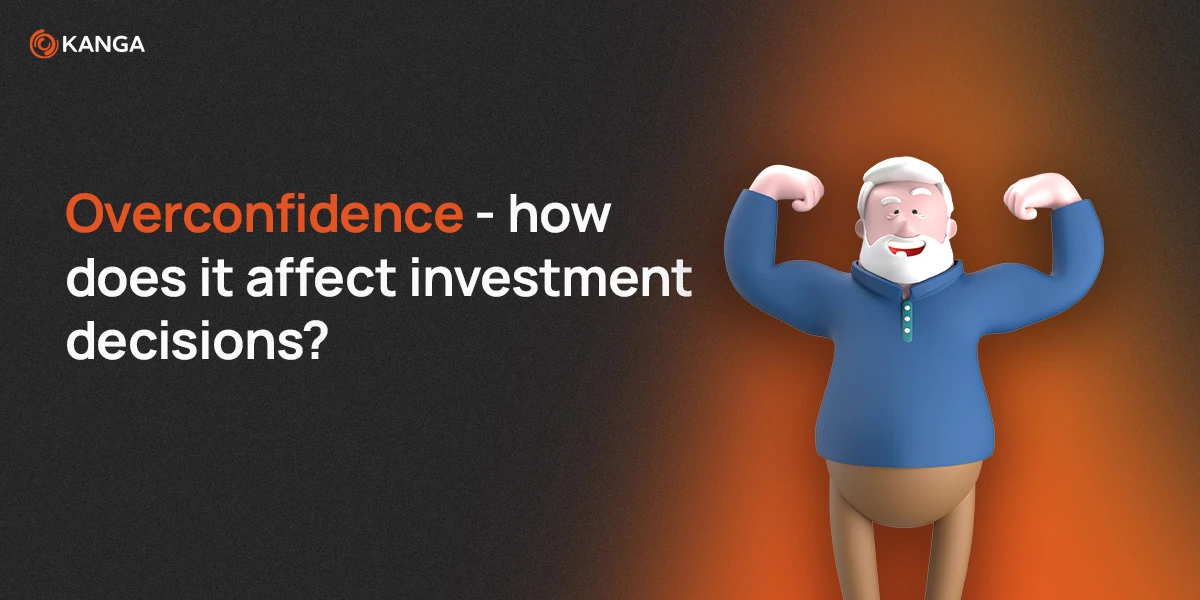Overconfidence - how does it affect investment decisions?

Written by
Kanga
Published on
Overconfidence, also known as excessive self-assurance, is one of the most common emotional mistakes that investors make. While investment is often thought of as a mere game of numbers, the truth is much more complex. Emotions like overconfidence can have a massive impact on investment decisions and often lead to tragic financial consequences. In this article we’ll examine why many investors think they’re better than others and how this affects their decisions.
Why Is Overconfidence Dangerous in Investment?
Overconfidence in managing digital assets can lead to a host of financial problems. This attitude often results in a lack of portfolio diversification, as the investor neglects the fundamental principle of risk dispersion, believing that their chosen investments are infallible.
Excessive self-assurance can also discourage thorough research and analysis, leading to underestimating risk and potential threats. Overconfident investors often seek only information that confirms their beliefs, ignoring any data that could challenge them. Furthermore, overconfidence can trigger emotions like greed or fear, leading to impulsive decisions. It might also prompt an investor to disregard valuable advice from experts or misuse financial leverage, thereby increasing potential losses.
Examples of Overconfidence in Investing
The Dunning-Kruger Effect and Its Impact on Investments:
The Dunning-Kruger Effect is a psychological mechanism whereby people with limited competencies in a specific area significantly overestimate their abilities and knowledge. In the financial market context, this effect can result in disastrous investment decisions. Investors, falling for the illusion of their expertise, may ignore key indicators and market signals, which in extreme cases can lead to substantial capital losses. They often bypass consultations with real experts, believing that their “intuition” and “experience” are sufficient to beat the market.
Lack of Portfolio Diversification:
As previously mentioned, overconfidence has a direct impact on an investment portfolio. An investor, confident in their analyses and forecasts, may be tempted to invest a significant portion of their capital in a limited number of assets, considering them as “sure things.” In practice, this means that a negative change in the value of one asset can significantly decrease the total value of the portfolio. Closing oneself off to various types of assets is a fundamental mistake that can cost an investor the loss of a significant portion or even all of their invested capital.
Tendency for Risky Speculations:
Overconfidence can also increase an investor’s appetite for risk and lead to making hasty and risky decisions, such as speculating in short-term markets or using highly leveraged financial instruments. These actions are magnified by a psychological effect called the “illusion of control,” where the investor believes they can predict and control complex market movements. More than once, such speculations end in quick and painful losses, which can even exceed the initial investment capital.
Of course, each of these elements individually is potentially harmful, but their combination creates an environment in which the likelihood of significant losses is significantly higher.
Overconfidence in Practice
Overconfidence is a psychological mechanism that leads not only to incorrect decisions in investing but also in business. Below we describe two well-known examples that illustrate how overconfidence has affected the fate of companies and investors.
The Case of BlackBerry:
In 2007, BlackBerry shares reached record values. The company was a leader in the field of smartphones with email and internet browsing functionalities. Many investors and analysts were convinced that BlackBerry would dominate this market forever. Overconfidence was part of a broader phenomenon where people believed that innovative technologies of the moment would remain unchanged and unquestionable. However, the situation dramatically changed when Apple introduced the iPhone in 2007. This new smartphone revolutionized the market, offering a touchscreen and numerous apps. BlackBerry could not adapt to these changes, and its business model, based on keyboards and corporate software, became outdated and unattractive. Overconfident investors suffered significant losses as the company’s stock value plummeted.
The Dotcom Bubble Era:
In the late ’90s, enthusiasm for new internet technologies led to a speculative bubble in the stock market. Many internet startups, often without real profits or even a business model, attracted massive investments. During this period, many investors, both individual and institutional, were convinced that the “old economy” was a thing of the past, and investing in the internet was a surefire way to profit. Unfortunately, the bubble burst in the early 2000s, leading to sharp declines in stock values and bankruptcies of many companies. Investors, confident in the reliability of their choices, ignored warning signals and, as a result, lost vast sums of money.
In both of these cases, overconfidence proved to be a detrimental attitude. Not only did it distort the investors’ perception of reality, but it also led to decisions that had long-term negative consequences.
How to Avoid the Overconfidence Trap?
Self-Awareness:
Understanding your emotions and their impact on investment decisions is crucial. In this situation, it is advisable, for example, to conduct regular portfolio reviews and ponder whether our decisions were dictated by logic or emotions.
Diversification:
Don’t put all your eggs in one basket! Portfolio diversification is one of the simplest but also most effective risk management methods.
Consultation with Experts:
Even if you’re confident in your skills, it’s always worth consulting with a financial or investment advisor. Such an external perspective can help you identify flaws in your thinking.
Summary
Overconfidence is one of the most destructive emotions in investing. Many investors have paid dearly for their excessive self-assurance, often losing significant sums of money. The key to avoiding this trap includes self-awareness, diversification, and the ability to accept external opinions.
The most important thing in investing is not the amount of returns you can get, but the protection of capital from losses. Do not let overconfidence harm your finances.